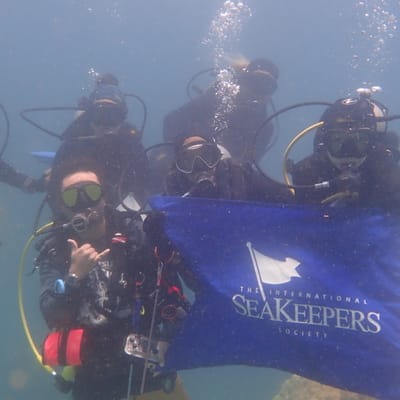Kapas Island Habitat Monitoring Expedition 2024

Kapas Island, Malaysia
May 30, 2024
Overview
As a collaborative effort within the "Bring Our Turtles Back" campaign, the 2024 Kapas Island Habitat Monitoring Expedition brought together dedicated partners to advance marine conservation in Terengganu, Malaysia, while collectively driving the campaign’s core objectives forward.
Taking place from May 30 to June 1, 2024, on Kapas Island, situated off the east coast of Terengganu, the Kapas Island Habitat Monitoring Expedition was a collaborative effort led by Universiti Malaysia Terengganu (UMT), partnered by The International SeaKeepers Society (Asia), Kapas Turtles, Pinang Films, and the Kapas Conservation Society.
The Mission: Preserving Biodiversity and Ecosystem Health
The expedition's primary mission was to assess and monitor the resilience of Kapas Island's coral reef ecosystems, which are vital for maintaining the island’s biodiversity—including its endangered sea turtles—and ensuring ecological balance.
Preserving coral reef biodiversity is essential not only for the marine species that rely on them but also for the broader health of the region's environment. Healthy coral reefs support diverse marine life, aid in carbon sequestration, and protect coastlines from erosion. The insights gained from this expedition are invaluable for shaping future conservation efforts and policies to protect these vital ecosystems.
A Collaborative Effort: Researchers and Citizen Scientists
Led by the dedicated team of UMT REEFS RIG, the expedition also brought together ten citizen scientists hailing from Singapore, Canada, Germany and Malaysia. This unique blend of academic expertise and public involvement highlighted the collaborative spirit of the project and aligned with the broader objectives of the "Bring Our Turtles Back" campaign, active since 2022. The campaign has successfully raised awareness about the urgent need to protect sea turtles and their habitats by actively engaging the Terengganu community.
This expedition expanded those efforts, offering a wider audience the chance to learn from the UMT researchers and marine biologists and participate directly in research and conservation activities. This knowledge exchange covered practical and theoretical skills such as underwater survey techniques, species identification, and data collection methods. The aim was to ensure that each diver could effectively contribute to the research while also gaining a deeper understanding of marine ecosystems.
Core Activities of the Expedition
The Kapas Island Habitat Monitoring Expedition involved a comprehensive programme of research and conservation activities, each designed to contribute to a holistic understanding of the coral reef ecosystem.
- Hatchery Management: This involved turtle patrols along nesting beaches to locate and monitor nests. Data collected on nesting and hatching success rates informed strategies to protect sea turtles, which are an integral part of the marine ecosystem.
- Exploring Coral Diversity and Benthic Communities: Evaluating the health and composition of the coral reefs, documenting coral diversity, abundance, and health. Benthic organisms, which play a crucial role in the ecosystem.
- Conducting Marine invertebrate surveys: The expedition examined the critical roles that invertebrates play in maintaining coral health, from promoting growth to defending against predators and pathogens.
- Identifying Coral Diseases: Identifying and understanding coral diseases was essential for developing strategies to mitigate their impact on the reefs.
- Water Quality Analysis: This involved monitoring physical, chemical, and biological parameters of seawater to assess potential pollutants and overall marine health.
- Plankton Analysis: Planktonic organisms, which respond to environmental changes, were studied to gain insights into the broader health of the marine ecosystem.
As a culmination of the expedition and as part of UMT’s community service programme, 80 first-year marine biology students joined the monitoring team in a series of activities aimed at fostering environmental stewardship and strengthening community collaboration on Kapas Island. Highlights included a beach cleanup and hands-on support for the Kapas Turtle Conservation project, where students transformed an outdoor classroom by building benches, cleaning the area, and creating informative posters. The Marine Advance Fair added a fun and educational element with games for kids and visitors. To cap it all off, awareness signage was installed to promote ongoing environmental consciousness on the island.
Conclusion: A Pathway to Sustainable Marine Conservation
The 2024 Kapas Island Habitat Monitoring Expedition was more than just a research trip. By bringing together scientists, citizen volunteers, and local communities, this expedition fostered a deeper understanding of coral reef resilience and contributed to the long-term preservation of these irreplaceable ecosystems. Through such initiatives, the "Bring Our Turtles Back" campaign continues to make significant strides in protecting Malaysia's marine biodiversity for future generations.

You must be logged in to post a comment.